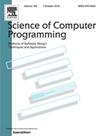HAMR AADL运行时中基于组件的系统的机械化语义
IF 1.4
4区 计算机科学
Q3 COMPUTER SCIENCE, SOFTWARE ENGINEERING
引用次数: 0
摘要
许多模型驱动的基于组件的开发都强调模型是“事实的单一来源”,不同形式的分析、规范、验证和代码生成都是通过模型集成的。这种愿景强烈依赖于清晰的建模语言语义,该语义为不同的工具和涉众提供了对模型含义的共同理解。在本文中,我们报告了SAE标准AADL建模语言关键方面的形式化语义的伊莎贝尔定理证明的机械化。该语义的主要目标是支持面向组件的契约规范和验证,以及在HAMR AADL模型驱动的开发工具链中实现的代码生成。我们提供了运行时系统状态、执行步骤、可达状态和属性验证的正式定义。从AADL模型到Isabelle规范的自动化HAMR翻译支持在实际应用中使用机械化。除了一般的验证支持之外,我们定义了为hamr生成的Isabelle模型自动证明的模型、系统状态和跟踪的格式良好的属性和相关证明。本文章由计算机程序翻译,如有差异,请以英文原文为准。
A mechanized semantics for component-based systems in the HAMR AADL runtime
Many visions for model-driven component-based development emphasize models as the “single source of truth” by which different forms of analysis, specification, verification, and code generation are integrated. Such visions depend strongly on a clear modeling language semantics that provides different tools and stakeholders with a common understanding of a model's meaning. In this paper, we report on a mechanization in the Isabelle theorem prover of a formal semantics for key aspects of the SAE standard AADL modeling language. A primary goal of this semantics is to support component-oriented contract specification and verification as well as code generation implemented in the HAMR AADL model-driven development tool chain. We provide formal definitions of run-time system state, execution steps, reachable states, and property verification. Use of the mechanization for real-world applications is supported by automated HAMR translation from AADL models into the Isabelle specifications. In addition to general verification support, we define well-formedness properties and associated proofs for models, system states, and traces that are automatically proven for HAMR-generated Isabelle models.
求助全文
通过发布文献求助,成功后即可免费获取论文全文。
去求助
来源期刊

Science of Computer Programming
工程技术-计算机:软件工程
CiteScore
3.80
自引率
0.00%
发文量
76
审稿时长
67 days
期刊介绍:
Science of Computer Programming is dedicated to the distribution of research results in the areas of software systems development, use and maintenance, including the software aspects of hardware design.
The journal has a wide scope ranging from the many facets of methodological foundations to the details of technical issues andthe aspects of industrial practice.
The subjects of interest to SCP cover the entire spectrum of methods for the entire life cycle of software systems, including
• Requirements, specification, design, validation, verification, coding, testing, maintenance, metrics and renovation of software;
• Design, implementation and evaluation of programming languages;
• Programming environments, development tools, visualisation and animation;
• Management of the development process;
• Human factors in software, software for social interaction, software for social computing;
• Cyber physical systems, and software for the interaction between the physical and the machine;
• Software aspects of infrastructure services, system administration, and network management.
 求助内容:
求助内容: 应助结果提醒方式:
应助结果提醒方式:


